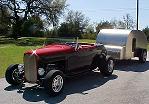Hey everyone,
I've been doing a lot of browsing on this site in the last few days trying to get everything compiled for my build. One of the things I've been trying to figure out is how to charge the battery in the trailer from the car when I'm under way. I've seen most of the posts on the subject, and I have no problem with running a lead from the front of my car ('03 Subaru Forester) to the rear if need be. During my thought process it occurred to me that I've got a 12v accessory plug in my trunk area that could also possibly be used (I'd tap into it from behind and run a lead from there). Plus, it only works when the car's ignition is on, thus stopping any battery drain.
I guess my question is: can it be done (safely)? Or am I barking up the wrong tree?
-Dave
Tapping into rear 12v accessory to charge the trailer
17 posts
• Page 1 of 2 • 1, 2
Tapping into rear 12v accessory to charge the trailer
"Only two things are infinite, the universe and human stupidity, and I'm not sure about the former."
-Albert Einstein
-Albert Einstein
-

boxfullofyertoys - Teardrop Inspector
- Posts: 17
- Images: 18
- Joined: Mon Mar 03, 2008 10:48 am
- Location: Collegeville, PA
Dave, what you are proposing will work, electronically. Don't know if it's physically practical, or not. The worst that would happen would be a blown fuse in the circuit that powers the accessory outlet, and then only if the trailer battery is pretty low when you connected them together as most of the accessory outlets are fused 30 amps.
SteveH
Calling an illegal alien an "undocumented immigrant"is like calling a drug dealer an "unlicensed pharmacist ".
Calling an illegal alien an "undocumented immigrant"is like calling a drug dealer an "unlicensed pharmacist ".
-

SteveH - 2000 Club

- Posts: 2101
- Images: 42
- Joined: Mon Nov 01, 2004 8:28 am
- Location: Bexar Co, TX






